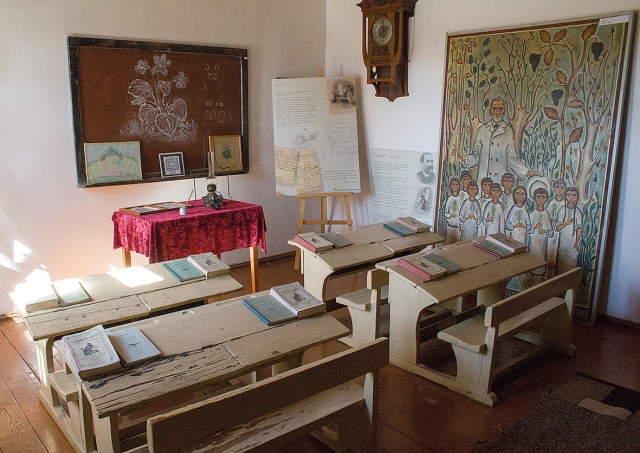Varia(n)(t)ions on a Theme
BLOG
Perhaps not many countries in the world can name a specific figure, complete with all necessary biographic details from birth to death, as the founder of their entire educational system. Georgia, while certainly having had others in a chain of centuries leading up to this person, can supply all the information you need about him and thus give him his properly deserved place in its history.
An old friend of mine lives in the village of Variani, near Gori, and is himself an English teacher. Meeting me for the first time in some years for a delightful reunion, he also took me to the house where Iakob Gogebashvili was born in 1840, now enlarged and turned into a busy museum dedicated to him. Outside, willows hang their branches over a natural trout pond, and the brick and stone Orthodox church where his father was a deacon is next door. Although I have lived in Georgia for 20 years now and have known who the man was for most of that time, I had never known where he actually came from.
Gogebashvili was a giant in the educational development of his country and its language, in a time when it was still part of the Russian Empire which had absorbed it in the beginning of the 19th century, including making its schooling take place in Russian. He wrote the original version of “deda ena” (Mother Tongue), the first primer on the Georgian language for children, still used to this day all countrywide, and displayed there in its original edition along with many other treasures. The book opens with the nicely palindromic “ai ia” (Here is a violet) and goes on from there to include the whole unique precious Georgian alphabet as a starting point.
Deda Ena Day is still celebrated annually in Georgia, especially in its schools, which owe their entire existence to this one man and his passion to see them begun.
There are many beautiful paintings on the museum’s walls illustrating scenes from the stories he told and wrote as part of teaching, and also of him opening schools; a full-scale mockup of his first classroom; letters of correspondence between him and other famous personages of his day such as Tsereteli, Chavchavadze, Paliashivili and others; and rooms with many of his own belongings in copies of their native settings.
Gogebashvili died unmarried and childless, and not rich either. The land that he owned in Tbilisi is where Ilia State University, Georgia’s main post-secondary institute for many decades, had its starting point. I was inspired to remark to our guide that he was in any case a father to all the children of Georgia from his time forward and including all future generations, through his tireless work to see them educated in all ways to help them enter adulthood and their world ready to face its challenges.
We also heard that as many as 100 groups a day from across the country visit the museum during its high season, to learn who gave them the three Rs (reading, writing and ‘rithmetic); and even in its low season, at least a group a day comes in. My hope is that this will continue, and that all schoolchildren in the country will have the opportunity not only to hear or read of him but also to come here in person, soak up the atmosphere, and be encouraged to persevere with their own studies, in whatever subjects are necessary, to become all that their gifts have for them.
Tony Hanmer has lived in Georgia since 1999, in Svaneti since 2007, and been a weekly writer for GT since early 2011. He runs the “Svaneti Renaissance” Facebook group, now with nearly 2000 members, at www.facebook.com/groups/SvanetiRenaissance/
He and his wife also run their own guest house in Etseri: www.facebook.com/hanmer.house.svaneti
By Tony Hanmer












